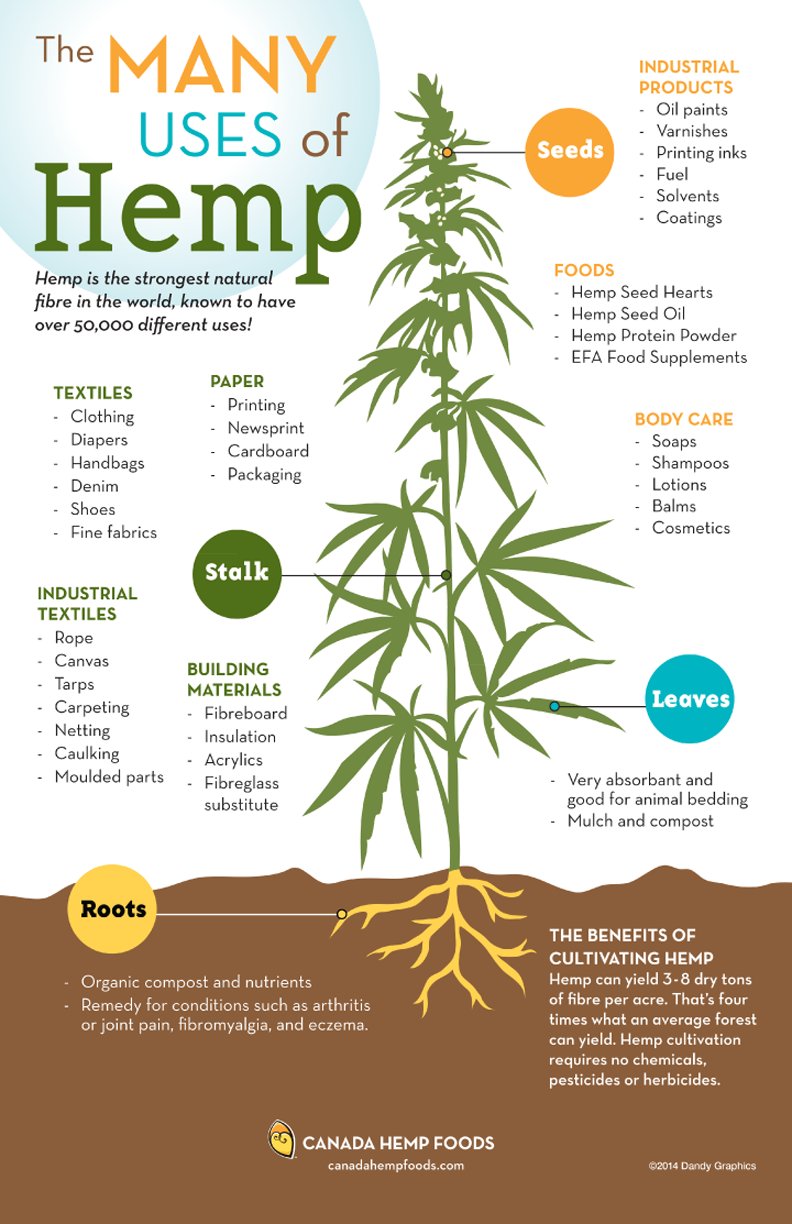How hemp and the Farm Bill may change life as you know it.IMAGE FEATURE: KLARA MAROSSZEKY, MANAGING DIRECTOR, AUSTRALIAN HEMP MASONRY COMPANY | TARA JONES/FLICKR
The 2018 US Farm Bill has now legalized commercial production of hemp. But what is hemp, and why should you care?
What is hemp?
Imagine a sweater softer than any fabric you’ve ever felt before, and more durable than cotton.
Imagine a car built with something lighter than steel that could stand 10 times the impact without denting.
Imagine if you could save four acres of trees by making paper from a single acre of a rapid-growing plant, instead.
Imagine biodegradable Legos.
Now imagine all this possibility actually exists but you can’t enjoy any of it because people in power once decided the plant from which it’s all derived has a scorned cousin named “marijuana.” If you can wrap your mind around this dereliction of logic, only then can you begin to understand the painfully silly policies America’s had in place that have kept hemp from coating our farmland with hues of pale yellow and light green.
That longstanding logic has been costly for our country. United States’ hemp prohibition has suppressed potential jobs for farmers, products for consumers, and medicine for patients.
Cousin or not, the reality is, hemp can’t get you high just as near beer can’t get you drunk (P.J., Squi, and I tried back in college and it just doesn’t work). Despite all that–and while near beer takes up three spots in every Walmart in America–hemp has been largely banned in the United States, until now.
To understand the differences between hemp and marijuana it’s critical to know what each distinctly different plant is capable of doing. The Ministry of Hemp offers the most comprehensive and easily-digestible explanation of hemp versus marijuana
Andre F Bourque ♕✔@SocialMktgFella
With all the talk about the #FarmBill, what is #hemp anyway? And why can’t it get me high? The chemical difference between hemp and #marijuana explained. https://youtu.be/PkmWS3ghXYU 24:19 AM – Dec 14, 2018See Andre F Bourque ♕’s other TweetsTwitter Ads info and privacy
The 2018 Farm Bill: How we got here.
Here’s what happened.
Way back when, an angry and lobby-influenced Congress passed the Marihuana Tax Act of 1937, which effectively outlawed the possession of cannabis—including hemp—after hundreds of years of growth and use from the time of British colonization onward. While that law was repealed in the late 1960s, cannabis was quickly included as a Schedule 1 drug (the most “dangerous” class of drugs including heroin) in the Controlled Substances Act, a designation which continues to this day.
After 81 years, the 2018 Farm Bill represents the largest step towards undoing the racist and scientifically-baseless legacy of the Marihuana Tax Act of 1937.
The 2018 Farm Bill officially reclassifies hemp for commercial uses after decades of statutes and legal enforcement conflating hemp and marijuana, the Farm Bill distinguishes between the two by removing hemp from the Controlled Substances Act. (While the two are closely related, hemp lacks the high concentration of THC that is responsible for the high from smoking marijuana.) This would effectively move regulation and enforcement of the crop from the purview of the Drug Enforcement Agency to the U.S. Department of Agriculture.
The 2018 Farm Bill expands upon provisions in the 2014 version of the annual bill, which created Hemp Pilot Programs. These Hemp Pilot Programs “created a framework for the legal cultivation by states of ‘industrial hemp’ without a permit from the Drug Enforcement Administration.” The 2014 Hemp Pilot Programs were a success for farmers and consumers across the U.S., from Colorado to North Carolina.
Senate Majority Leader Mitch McConnell continues to be ardently anti-marijuana, despite the success of these programs and the fact that 62% of Americans say recreational marijuana should be legal. Nevertheless, McConnell and Senate Republicans read the political tea leaves and will now recognize the important differences between marijuana and hemp. In doing so, they’re creating an exciting time for entrepreneurs, CBD advocates, and farmers across the country.

A major change to the farm bill compromise is the legalization of industrial hemp –– a boon for the increasingly popular CBD oil industry.https://n.pr/2zSfyii 34510:01 PM – Dec 11, 2018Twitter Ads info and privacyFarm Bill Compromise Reached With SNAP Changes Out, Industrial Hemp InWhile much of the farm bill draft mirrors current law, there is a major change coming for farmers: Industrial hemp will be legalized. Forestry and food stamps became sticking points.npr.org163 people are talking about this
Why this makes political sense
President Trump’s trade wars are hurting farmers to the tune of billions of dollars. Wheat, soybean, and corn farmers have been targeted by China as the potent measure in its escalating tariff battle with the U.S.
In 2017, China imported more than $24 billion in agriculture products from the U.S. The world’s top wheat consumer, China and purchased 1.6 million tons of U.S. wheat worth $391 million. At the same time, China bought $14 billion in soybeans for personal and animal consumption from the U.S. last year–more than any other agricultural commodity, and the country’s corn imports from the U.S. were worth $160 million.
All that’s changed with the high trade tariffs Trump’s levied on countries who import our products. Analysts and existing evidence suggest the soybean trade conflicts will be in favor of fellow exporters, Brazil and Argentina, rather than the U.S. The tariff could drop China’s imports of soybeans by 69% on average. The estimated effect of China’s 25% tariff on U.S. soybean imports would cut income for a midsize Illinois grain farm by an average of 87% over four years, prompting a loss of more than $500,000 in the farm’s net worth by 2021.
It’s a messy situation. Trump needed a win, and farmers did too. Distinguishing between commercial hemp and marijuana, legalizing the former, is that much-needed reprieve.
“We’re so pleased farmers across America now have the freedom to consider integrating this important crop into their production, particularly with the trade concerns around other crops such as soybeans, corn, and wheat,” said Elizabeth Hogan, VP of Brands at GCH Inc., the company behind Willie Nelson’s cannabis brands. Hemp legalization will transform it from niche interest and return it to cash crop status.
Hemp is a farmer’s friend because compared with cotton, corn, and soybeans, it requires little water, isn’t picky when it comes to poor soil. It grows tightly spaced, thus crowding out weeds, and boasts a deep, soil-aerating root system. Despite all its advantages, and because growing it is illegal with the exception of limited licenses, the U.S. imports approximately $60 million worth of hemp from overseas countries like China.
Political leverage
This Farm Bill gives Trump Administration a powerful tool in their bargaining with China. As I wrote earlier this year in Forbes, China produces 50% of the world’s cannabis supply, with a large majority of that supply being the THC-lacking hemp variety; this gives China “massive economic potential” which “poses a threat to cannabis interests around the world and particularly in the U.S. market.”
Studies at Bejing’s Hemp Research Center revealed the variety of plant uses, prompting China to expand its hemp production which is a mere fraction of its world-leading cotton production. China not only has the product, but they have the cultivation techniques and commercial technologies to capitalize on that supply. And they are ramping up to leverage their competitive hemp advantage, expecting an eager demand from U.S. manufacturers given hemp’s rise in popular applications.
By contrast, U.S. farmers grew merely 25,000 acres of hemp in the entire country in 2017. To give that context, that’s the same amount of land Bill Gates bought in Arizona to create a small, futuristic city.
That’s cool for a retirement project if you’re a billionaire, but hardly enough land to launch any sort of industry. And of that, about 70% of which was used to make CBD oil. Only recently have we seen an increase in manufacturers using hemp fibers to make fabrics, construction materials, health products, and other consumer goods.View image on Twitter

Andre F Bourque ♕✔@SocialMktgFella
With over 50K commercial, medical, and personal ways it can be used, #hemp is poised to shake the nation with #legalization. #FarmBill18 #FarmBill18 @NatHempAssoc6912:18 AM – Dec 13, 201840 people are talking about thisTwitter Ads info and privacy
With the passage of the 2018 Farm Bill, America will have a chance to counter China’s massive influence in the cannabis hemp industry. But it will mean playing catch-up for the foreseeable future. Currently, hemp cultivation techniques in America lag far behind other crops—it still has to be harvested by hand even. Even though marijuana is legal in China, the country has funded research into the plant and its cultivation, placing it miles ahead of other countries.
The Farm Bill will help hemp farmers and entrepreneurs
The 2018 Farm Bill will radically overhaul America’s relation to hemp and could unleash a hemp renaissance in the coming years that will close the gap between the U.S. and China. As a Schedule 1 substance alongside marijuana, hemp farmers and entrepreneurs in the U.S. have faced many barriers to doing business. Interstate commerce for hemp products was almost non-existent and financing was difficult to come by. But all that is set to change.
According to the American Agriculturist, the 2018 Farm Bill will allow hemp to be regulated by the USDA, including the labeling of American-grown hemp as certified organic; interstate hemp commerce will be legalized; financing and research opportunities will open up; hemp farmers will be guaranteed water rights; the definition of hemp will be altered to make it a non-drug commodity.
Hemp has hundreds of uses, many of which are yet to be discovered or fully realized thanks to the lack of available research funds. From textiles and plastics to livestock feed and home cooking, hemp has many applications that can reduce our dependence both on other countries and fossil fuels. Driven by explosive growth in hemp-based consumer products, the global hemp market is expected to jump to $10.6 billion by 2025. Everything from our vodka to our cars is waiting to be reimagined in the future with legal hemp. Many people won’t even realize how much their lives are affected by cannabis-based products.
One of the most exciting applications of hemp lies in the extracted cannabinoids or CBD oil. According to the Washington Post, “dozens of studies have found evidence that the compound can treat epilepsy as well as a range of other illnesses, including anxiety, schizophrenia, heart disease, and cancer.” With the legalization of hemp, CBD can be regulated and researched much more than before to truly understand the medical efficacy for a wide range of diseases.View image on Twitter


This statistic shows the total U.S. consumer sales of CBD (cannabidiol) from 2014 to 2106, and estimates until 2022, in million U.S. dollars. It is estimated that in the year 2020 CBD consumer sales will total around 1.15 billion U.S. dollars.
Source: https://www.statista.com/statistics/760498/total-us-cbd-sales/ …29:00 PM – Aug 8, 2018See Jason’s other TweetsTwitter Ads info and privacy
“We continue to see great progress towards a new perspective on cannabis within the US. Within healthcare, several conditions and certain patient profiles rely heavily on CBD-only products of which the proposed Farm Bill will work to dramatically improve access to patients – not only in the US but globally,” said Prad Sekar, CEO of CB2 Insights in a written interview.
All of those uses make hemp a profitable cash crop for suffering farmers, with some early commercial growers reporting $100 per-acre more profit on hemp than canola. Hemp grown for CBD oil, on the other hand, can take in $8,000 per acre versus $600 per acre for corn. In particular, hemp can be a boon for arid western states. According to Pacific Standard,
Hemp can be grown to harvest on about half as much water as corn can, for example. Hemp also tolerates a wide variety of soils and temperatures, requires no pesticides, and grows extremely fast, soaring to as much as 20 feet in 100 days.
Thus, if hemp eventually replaces other crops across large acreages, it could free up precious water supplies in the arid West for other uses. This could become especially important with climate change expected to shrink Western mountain snowpacks.
Hemp is thus profitable and sustainable, two words which have eluded many U.S. farmers as of late. Hemp cultivation could provide much-needed relief as farmers struggle to find markets for millions of bushels of crops during the trade wars. Now, instead of importing an estimated $100 million of hemp products every year, that money will go to American farmers and entrepreneurs.
Bruce Perlowin, CEO of Hemp, Inc, (OTC: HEMP), believes hemp legalization will drive disenfranchised farmers “back-to-the-land” now that they’ll have a solid economic basis in industrial hemp to rely on. “Our strategy has been to partner with farmers across the country in states where hemp cultivation and manufacturing is legal to provide them with the infrastructure needed to make a profit off this incredible crop, and this bill will be an incredible boon for the American small family farm,” Perlowin told me. “The health and wellness industries are in for a major overhaul with the massive research and development and exploration into CBD‘s, CBGs, CBN’s and 113 other cannabinoids as well as some 300 terpenes found in the industrial hemp plant.”
—
Disclosure: I have no financial interest or positions in the aforementioned companies. This information is for educational purposes and does not constitute financial and/or legal advice.
Follow me on Instagram and Twitter
Andre is a cannabis connector and the VP of Bus. Dev. for Verdantis Advisors, a full-service consulting agency.
Andre BourqueContributor
Andre Bourque (@SocialMktgFella) is a cannabis industry connector, brand advisor, contributing writer, and the Vice President of Business Development for Verdantis Advisors, a full-service cannabis consulting agency. Verdantis specializes in cannabis industry investments, mergers and acquisitions, funding, partnerships, marketing, and media. Andre is the managing director of the cannabis division of Miramar Brands, a legacy full-service licensing agency representing Elle Magazine, Target, Kohl’s, Spalding, and other leading brands. We work with cannabis brands to leverage powerful mainstream names in the production of new products, channels, and markets. Andre is also the managing director of North America for blockchain marketing agency ICO Launch Group. In addition to Forbes, Andre’s articles have been featured in The Huffington Post, Entrepreneur.com, Benzinga, Yahoo Finance, Ebony, CIO Magazine, ComputerWorld, and Social Media Today. Andre has held technology marketing positions in the aerospace industry, at Sun Microsystems, Intel, Technorati, and several startups. Andre is a card-carrying member of Souplantation’s Club Veg.



